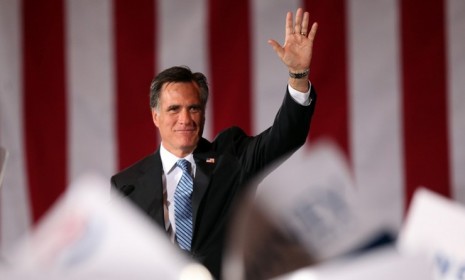Why GOP voters are sitting out the primaries: 4 theories
Republicans are supposedly fired up about making Obama a one-term president. So why are they so meh about choosing a candidate to face him?

A free daily email with the biggest news stories of the day – and the best features from TheWeek.com
You are now subscribed
Your newsletter sign-up was successful
Mitt Romney handily won the Nevada GOP presidential caucuses on Saturday, taking 50 percent of the votes and all but three counties. However, only about 33,000 people caucused — 10,000 fewer than four years ago, and about half the number state Republicans were predicting. The disappointing turnout follows underwhelming Republican participation in Iowa, New Hampshire, and especially Florida. Aren't Republican voters supposed to be "fired up to dispose of the Obama presidency?" asks Ed Rogers at The Washington Post. Maybe not. Here, four explanations for the GOP's lagging turnout:
1. GOP voters are disappointed with the candidates
Democrats voted in their primaries and caucuses in record numbers in 2008 because they had "two candidates with fervent support," says Carter Eskew at The Washington Post. This year's shrinking GOP numbers "support the general consensus that the field is weak," and Republicans are reacting with a "curious" indifference. "There's a lot of people not satisfied with any of the candidates out there," said one of those candidates, Rep. Ron Paul (R-Texas), on Sunday. "And that's why in many ways we're seeing a lower turnout right now."
The Week
Escape your echo chamber. Get the facts behind the news, plus analysis from multiple perspectives.

Sign up for The Week's Free Newsletters
From our morning news briefing to a weekly Good News Newsletter, get the best of The Week delivered directly to your inbox.
From our morning news briefing to a weekly Good News Newsletter, get the best of The Week delivered directly to your inbox.
2. Actually, it's just Romney who fails to excite voters
"When Newt Gingrich surged in South Carolina, he brought along massive gains in turnout — record turnout, in fact," says Mathew D. Staver in The Washington Times. When Romney "surged" in Florida, turnout dropped 12 percent. Clearly, the real problem isn't the GOP field, it's Romney. In his big Nevada win, Romney trounced his opponents with... just under 16,500 votes, says Dean Esmay at Dean's World. "Romney's Achilles heel continues to be voter enthusiasm," and it will be a problem when "dispirited conservatives" stay home in November.
3. Negative campaigning is turning off voters
Sure, Romney isn't a particularly strong frontrunner, says Mike Smithson in Britain's The Telegraph. But this is more about "the impact of negative campaigning." After a brutal, exceedingly expensive slash-and-burn ad blitz between Romney and Gingrich in Florida, turnout plummeted. "There have been a number of academic studies that suggest that while negative campaigning can motivate the base of support it can also alienate other voters, thus reducing voter turnout."
A free daily email with the biggest news stories of the day – and the best features from TheWeek.com
4. Saturday caucuses are inconvenient
The average GOP voter ardently wants Obama to be a one-term president, but doesn't much care which candidate replaces him, say Nevada Republicans — at least not enough to give up a Saturday. "Republicans are excited to get a new president in," Nevada GOP official David Buell tells the Las Vegas Sun. "Are they excited about going to a caucus? Apparently not."
-
 American universities are losing ground to their foreign counterparts
American universities are losing ground to their foreign counterpartsThe Explainer While Harvard is still near the top, other colleges have slipped
-
 How to navigate dating apps to find ‘the one’
How to navigate dating apps to find ‘the one’The Week Recommends Put an end to endless swiping and make real romantic connections
-
 Elon Musk’s pivot from Mars to the moon
Elon Musk’s pivot from Mars to the moonIn the Spotlight SpaceX shifts focus with IPO approaching
-
 The billionaires’ wealth tax: a catastrophe for California?
The billionaires’ wealth tax: a catastrophe for California?Talking Point Peter Thiel and Larry Page preparing to change state residency
-
 Bari Weiss’ ‘60 Minutes’ scandal is about more than one report
Bari Weiss’ ‘60 Minutes’ scandal is about more than one reportIN THE SPOTLIGHT By blocking an approved segment on a controversial prison holding US deportees in El Salvador, the editor-in-chief of CBS News has become the main story
-
 Has Zohran Mamdani shown the Democrats how to win again?
Has Zohran Mamdani shown the Democrats how to win again?Today’s Big Question New York City mayoral election touted as victory for left-wing populists but moderate centrist wins elsewhere present more complex path for Democratic Party
-
 Millions turn out for anti-Trump ‘No Kings’ rallies
Millions turn out for anti-Trump ‘No Kings’ ralliesSpeed Read An estimated 7 million people participated, 2 million more than at the first ‘No Kings’ protest in June
-
 Ghislaine Maxwell: angling for a Trump pardon
Ghislaine Maxwell: angling for a Trump pardonTalking Point Convicted sex trafficker's testimony could shed new light on president's links to Jeffrey Epstein
-
 The last words and final moments of 40 presidents
The last words and final moments of 40 presidentsThe Explainer Some are eloquent quotes worthy of the holders of the highest office in the nation, and others... aren't
-
 The JFK files: the truth at last?
The JFK files: the truth at last?In The Spotlight More than 64,000 previously classified documents relating the 1963 assassination of John F. Kennedy have been released by the Trump administration
-
 'Seriously, not literally': how should the world take Donald Trump?
'Seriously, not literally': how should the world take Donald Trump?Today's big question White House rhetoric and reality look likely to become increasingly blurred